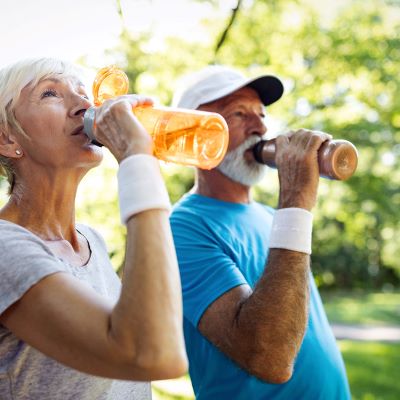Senior Safety Tips for Outdoor Summer Activity
Posted July 10, 2023

With summer in full swing, you may be looking for any reason to be outside enjoying the beautiful weather — which includes exercising.
However, for older adults, this comes with an added risk for heat-related illnesses. Individuals over the age of 60 have a decreased ability to regulate their body temperature thus leading to an increased risk of heat exhaustion, dehydration, and even heat stroke. To limit your risk, keep your structured exercise inside during the summer months.
To ensure your safety, consider these tips when engaging in outdoor activities:
1. Stay Hydrated
Prior to, during, and after your time outside, make sure to drink plenty of fluids. Proper hydration is essential for combating the effects of heat.
2. Dress Comfortably
Opt for loose-fitting clothing and avoid wearing too many layers. This allows for better air circulation and helps regulate body temperature.
3. Time It Right
Avoid being outside during periods of excessive heat or humidity. Stay informed by tuning in to your local weather service for heat advisory warnings.
4. Morning Is Best
The afternoons tend to be the hottest part of the day, posing the greatest risk for heat-related issues. Plan your outdoor activities for the cooler morning hours to minimize the chance of heat exhaustion.
5. Seek Shade
Limit your direct exposure to sunlight by finding shaded areas or cooler environments. This can significantly reduce the risk of overheating.
6. Recognize the Signs
Educate yourself on the symptoms of heat-related illnesses. If you experience heavy sweating, faintness or dizziness, a weak and rapid pulse, muscle cramps, extreme thirst, headache, or nausea/vomiting, immediately seek shelter in an air-conditioned space to cool down.
Taking your physical activity outdoors can be quite rewarding; however, you should know your limits. By keeping your planned exercise routine indoors, it will allow you to stay cooler yielding better performance and fewer complications.
If you’re looking for a place to escape the heat, check out the programs available at the Summa Health Wellness Center.
About the Author

Mike Smeltzer, ACSM EP-C
Vitality eNews Sign Up
Receive the Summa Health eNewsletter for the latest health tips, advice and updates.
Thank you for subscribing to the Vitality eNewsletter.
We're sorry, there was an error while processing your request. Please try again.
Related Blogs
Being diagnosed with a serious illness or chronic condition can feel overwhelming, leaving you and your loved ones facing physical and emotional challenges — with a heavy dose of uncertainty.
However, there’s good news: You don't have to face it alone. Help is available in the form of palliative care, a medical specialty designed to improve the quality of life for people in different stages of serious illness.
Think of palliative care as an extra layer…
A healthy lifestyle is a lifetime pursuit. But as you age, it becomes even more important to maintain healthy habits to keep you strong and active longer, while maintaining a good quality of life well into your later years.
After age 50, your risk increases for heart disease, diabetes, arthritis, dementia, cancer and other chronic illnesses. In fact, chronic illness is the leading cause of death for older adults in the United States, according to the National…
With the Summa Health Level One Trauma Center being the first level-one trauma center in the Akron area, our expert trauma staff has caring for patients with injuries from falls for more than 25 years. And as the Baby Boomer generation is getting older, we are seeing more and more patients coming in with a higher incidence of falls.
Assessing the risk of falls in elderly patients
All geriatric patients who come into Summa Health emergency departments are screened for risks of…
As we age, some people get something commonly known as "the hump”. This is when a person has an abnormal outward curve of the upper back, rounded shoulders and a stooped posture. Known as Dowager's hump or kyphosis, the condition is directly related to osteoporosis or thin, brittle bones.
Approximately 8 million females and 2 million males have osteoporosis in the U.S. Another 44 million Americans have osteopenia. Individuals with these conditions have increased…
Falls are an unfortunate, yet frequent complication for people with neurological disorders. Neurological disorders affect the brain, spinal cord or peripheral nerves. Examples include pinched nerves in the spine, neuropathy, stroke, traumatic injuries to the brain or spine and Parkinson’s disease. These conditions can cause muscle weakness, balance issues, poor coordination, loss of sensation, pain and much more.
Do you often find yourself replying, “Say that again,” during a conversation? Do you have difficulty understanding words while in a crowded place? Does it seem as if your loved one is mumbling or talking quieter than usual? These could be signs of hearing loss.
As we age, hearing lossis a common problem. In fact, nearly 25 percent of people ages 65 to 74 and half of those who are 75 and older have disabling hearing loss, according to the National Institutes of…
Are you feeling the pressure to live a heart-healthy lifestyle? You’re not alone.
Heart disease is the leading cause of death for men and women in the United States, according to the American Heart Association (AHA). What’s more, nearly half of all adults in this country are living with some type of cardiovascular disease.
The good news is you don’t have to be a statistic. While genetics do play a role in heart disease, there are several risk factors that can…
High blood sugar can cause gradual, unassuming symptoms that can sneak up on you. Frequent urination and excessive thirst — the telltale signs of type 2 diabetes — are often mild and can easily be attributed to other factors.
In fact, most people don’t even know they have high blood sugar until they’re diagnosed with type 2 diabetes.
Diabetesis a chronic condition that causes glucose (or sugar) levels in the body to rise. The problem is ignoring or…
Last winter, the community took several precautions to help stop the spread of COVID-19. From masks and social distancing to virtual work and school to cancelled events, an unforeseen positive side effect was a less intense flu season.
Flu cases documented during last year’s flu season were historically low by a wide margin. Medical professionals haven’t seen anything like it.
So with many precautions still in place amidst an ongoing pandemic, you may be…
February is Black History Month, when we recognize African-Americans and those of color who have played major roles in shaping our present culture. February is also American Heart Health month – a time to raise awareness of heart disease. While these two events are different, they are linked in healthcare. Heart disease remains the number one killer of Americans, and African-Americans are 20 percent more likely to die from heart disease than non-Hispanic whites.
We do not…
Bladder cancer is the most common urologic cancer in both men and women. Each year, about 57,000 men and 18,000 women are diagnosed with the disease, according to the Centers for Disease Control and Prevention (CDC).
But, urologic cancers don’t only affect the bladder. They also can affect the kidneys, ureter (tubes that carry urine from the kidneys to the bladder), urethra, and specifically in men, the penis, prostate and testicles.
In fact, the CDC states prostate…
You’ve seen it on the soccer field or basketball court: a player plants a foot, twists and goes down grabbing a knee. The problem is most likely tearing of the meniscus (cartilage) or ACL (anterior cruciate ligament). Both can be extremely painful and sideline an athlete for months of recovery.
A tear usually requires more intervention than a strain or sprain.
A knee strain is a stretch or partial tear of a tendon or muscle, while a sprain is a stretch or tear of a…
These are critical heart health numbers that should not be ignored and include blood pressure, resting heart rate, cholesterol, blood sugar and body mass index. Heart disease is the leading cause of death for…
As our loved ones get older, it’s normal for them to lose a little bit of their mental sharpness, and it’s easy to rationalize and gloss over strange behavior. After all – we all forget things once in a while. When memory and mental issues start affecting daily life, it could be a sign of something more serious. While a qualified physician is needed to diagnose someone with Alzheimer’s disease, there are some signs and symptoms that can suggest a…
Billions of dollars have been spent on researching Alzheimer’s, but it stubbornly continues to affect 1 in 10 Americans over the age of 65. While we are still waiting for a cure, there have been significant advances that have made an impact on the treatment of Alzheimer's and related diseases:
New treatments and positive trials on the horizon
Currently, the medications on the market for Alzheimer’s only relieve symptoms of the disease. None stop the progression.…
Deep, consistent, quality sleep can not only make you feel great during the day; it can also improve your health. Sleep can boost your mood, help you maintain a healthy body weight and help your heart and mind function at tip-top levels.
But, for some of us, a solid night's sleep may seem like a dream. Lack of sleep can affect our brain's ability to react properly; so much so, that our body’s overall health can be at risk.
